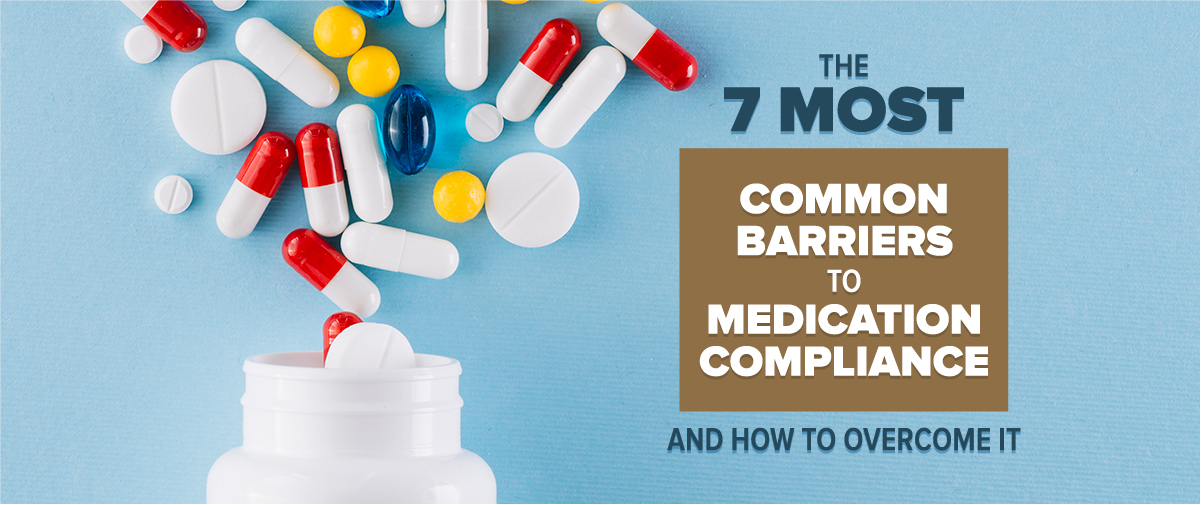Posted by Anne Joyce Raymundo on Dec 11th 2018
The 7 Most Common Barriers To Medication Compliance And How To Overcome It

Medical adherence and compliance explained in layman's terms is the taking of medication at the right time in the right way the right time of day with the right number of times. In today's society more and more people are out there not taking their prescribed medication properly.
Most of the times there are overdose episodes because in today's time and age we are over medicated. Patients nowadays are taking a lot of medications. Statistics show that 20 to 30% of new prescriptions are never filled at the pharmacies and also 20 to 30% the CDC says, people walk out of the doctor's office and not even take the prescribed medication 50% of the time. Doctors say that for example, a patient needs to take the blood pressure pills one in the morning and one at night, 50% of the time the medication is not followed. This is for a long-term disease state. Based on the latest data from the CDC and presented in descending order, here are the top 10 most expensive chronic diseases for healthcare payers to treat; Alcohol-related health issues, Diabetes, Alzheimer's disease, Cancer, Obesity, Arthritis, Asthma, Stroke.
Globally, the increasing state of chronic diseases becomes prevalent but the adherence to treatment regimens still remains low. Non- adherence is associated with poorer clinical outcomes and in aging populations. Multiple diseases and polypharmacy among older adults further challenge the good coordination of care.
COMMON Barriers to Medication Compliance include the following:
1. High Cost of Medication
One of the most common barriers to adherence is the high cost of medicines. The inability to pay for healthcare in today's society results to high co-pay which ultimately affects most of the seniors. Some of these healthcare often assess the prescription of generic drugs that is mandate by law which will give these patients the freedom to choose. Prescribe generics when possible; offer information about prescription assistance programs and offer less costly sources of medications.
2. Forgetting to take the medication.
This is very common to those seniors or elderly patients managing chronic diseases. It also is due to the complexity of medication. Some of the methods to combat this is to suggest ways to remind patients using pill boxes or cell phone alarms; simplify the regimen if possible; provide information on PillPack s and sometimes suggest pharmacist counseling. If the patient is unable to refill, it is advised to Write a longer prescription; suggest a pharmacy refill reminder or auto-refill system.
3. Side Effects that comes with the medication.
Some patients stop taking their medications without informing their doctors. Some of them even think that they are allergic, although, often times they are not. When this happens, it is better to talk to the medical practitioner or ask them to prescribe a substitute medication; suggest ways to manage or reduce side effects; or change the dose.
4. The complexity of the Regimen.
Compliance packaging; sorting all pills into easy-to-manage packages that detail frequency and time of day to take, may be ideal for patients on complex drug regimens. However, it’s not a one-size-fits-all solution, so asking a few questions about preferences is a good idea before making a recommendation. Following up and adjusting the course may be necessary to get it right. According to Amerisource Bergen, consider switching to once-a-day or combination therapy; simplify the regimen if possible; suggest pharmacist counseling; determine if any medications can be safely discontinued.
5. Poor knowledge of the illness and medication.
In general, non- compliance is often due to not fully understanding the treatment plan. Patients need time - if there is time - to process what's been shown and/or said to them regarding their illness. Oftentimes, the patient is dealing with a whirlwind of emotions when receiving a serious or new diagnosis. Thus, their ability to immediately and successfully participate in their treatment objectives are diminished. Physicians and busy nurses alike often don't have the time (or take the time) needed on individual cases, so that the patient's full understanding, and, hopefully, full investment in participation is likely. Use plain language indications on the prescription; use teach-back to ensure that the patient understands; use color-coded stickers to indicate dosing; use visual aids.
6. Access to Pharmacy.
The biggest reason is the accessibility of the pharmacist in relation to other healthcare professionals. At any given time a pharmacist may need to answer multiple phone calls, consult with several patients, and complete multiple prescriptions for waiting customers. Try to determine and address the source of the access issues; suggest mail order options.
7. Independent Assessment and taking of drugs.
Some medical treatments take time to have an effect. In order to be successful, the patient needs to internalize the lifestyle changes he or she is about to undertake. Some of them think that they are well and fine so they tend to stop taking in their medications. The best way to do this is to explain how the patient’s disease affects the body and use teach-back to ensure your patient understands.
In all of these instances, it is still much better to seek proper medical help and attention to the right professionals. Get to know your pharmacists and build a relationship with them or your doctors. By being vigilant enough and knowledgeable about a medication, will ensure that patients can get the utmost care they deserve. Although, there are adverse effects, patients should likewise consult their physicians and get to know more about proper resolutions to overcome these barriers. You can even talk to your pharmacist about your medication regimen because some of these complicated medications can be customized.
Want to learn more? Listen to this episode of The Healthy Way Radio Show:

